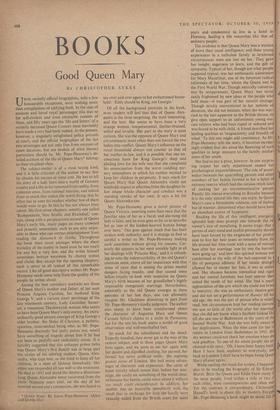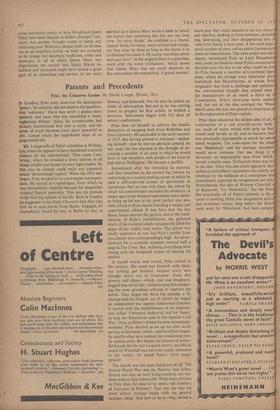BOOKS
Good Queen Mary
B Y CHRISTOPHER SYKES Utsrrn. recently official biographies, with a few honourable exceptions, were nothing more than compilations of edifying bosh. In the case of eminent and loved royal personages this was so for self-evident and even excusable reasons of State, and fifty years ago the 'life and letters' of a recently deceased Queen Consort must inevitably have made a very bad book indeed. At the present, however, a singularly enlightened policy prevails at court, and the official biographies of the last two sovereigns are not only free from excesses of court decorum, but are models of what literary portraiture should be. Mr. Pope-Hennessy's de- tailed account of the life of Queen Mary* belongs to their excellent class.
The subject-matter is of a most taxing kind, and it is little criticism of the author to say that he obtains his success at some cost. He has to tell the story of a lady born into a world of German royalty and a life so far removed from reality, from common sense, from rational interests, and indeed from so much that makes life worth living, that he often has to coax his readers whither few of them would want to go. In this he has not always been adroit. His first seven chapters, notably one called `Rumpenheim, Neu Strelitz and Rheinthal,' con- tain, along with a perspicacious account of Queen Mary's early life, many pages on many crowned and princely nonentities, such as are only enjoy- able to those who can extract entertainment from reading the Almanac!, de Gotha. Throughout the book there occur passages where the sheer triviality of the matter in hand must be too much for any but a very few, and the writer himself sometimes betrays weariness by clumsy syntax and cliché. But, except for the opening chapters, such is never at all typical of this remarkable record. Like all good descriptive writers Mr. Pope- Hennessy needs some help from the quality of the people he writes about.
Among the best subsidiary portraits are those of Queen Mary's mother and father, of her aunt Princess Augusta Caroline, her husband King George V, and a curious court personage of the late nineteenth century, Lady Geraldine Somer- set, a venomous Thackerayish woman who seems to have been Queen Mary's only enemy. An extra- ordinarily good picture emerges of King George's elder brother, the Duke of Clarence, a pathetic, spineless, swan-necked being who, as Mr. Pope- Hennessy discreetly but justly points out, would have something of tragedy about him if he had not been so pitifully and undeniably comic. It is forcibly suggested that this unhappy prince (who was Queen Mary's first fiancé) was in large part the victim of his adoring mother, Queen Alex- andra, who kept him, as she tried to keep all her children, in a state of lifelong immaturity. Her eldest son responded all too well to the treatment. I-le died in 1892 and saved the throne a disastrous king. Queen Alexandra never recovered from the blow. Nineteen years later, on the day of her beloved second son's coronation, she was heard to
- * QUEEN MARY. By James Pope-Hennessy. (Allen and Unwin, 42s.)
say over and over again to her embarrassed house- hold: 'Eddy should be King, not Georgie.'
Of all the background portraits in the book, most readers will feel that that of Queen Alex- andra is the most surprising, the most interesting, and the best. She seems to have been a very strange woman, temperamental, feather-brained, wilful and lovable. Her part in the story is most curious. She was the opposite of Queen Mary and circumstances more often than not forced the two ladies into conflict. Queen Mary's influence on the royal household always ran counter to that of her mother-in-law, and it is possible that one un- conscious basis for King George's deep and abiding love for his wife was that she completed his emancipation from the warm coddling nur- sery atmosphere in which his mother wanted to keep her children in perpetuity. It says much for Queen Mary that Queen Alexandra could not withhold respect or affection from the daughter-in- law whose whole character and conduct was a standing rebuke of her own. It says a lot for Queen Alexandra too.
Mr. Pope-Hennessy gives a novel picture of Queen Victoria, asserting more than once that the familiar idea of her as a harsh and alarming old lady is false, and he even goes so far as to describe her as 'one of the kindest-hearted human beings ever born.' This goes against much that has been written with authority, and it is strange to find so careful a writer as Mr. Pope-Hennessy making such assertions without giving his reasons. Cer- tainly she appears in her most amiable light in all her dealings with 'Princess May,' and it is refresh- ing to note the indestructibility of the old Queen's common sense, above all her impatience with that sense of caste that is among the prime mental dangers facing royalty, and that caused some fellow-royalty to look with suspicion on Queen Mary's birth because of her grandfather's highly respectable morganatic marriage. Nevertheless, admirably as the old Queen emerges in these episodes of her last days, one can allowably imagine Mr. Gladstone dissenting in part from Mr. Pope-Hennessy's kindly judgment. The author also seems to have been misinformed about the character of Augustus Hare and Queen Carmen Sylva's claims to a niche in Parnassus, but for the rest his book seems a model of good observation and well-marshalled fact.
So much for the subsidiaries and the detail. Expertly handled, they never get in the way of the central subject, and in these pages Queen Mary lives again, and we seem to see her again with her quaint and dignified clothing, her parasol, her formal but never artificial smile : the supreme grande dame of London. She had many advan- tages of character and experience. She came of lesser royalty which meant that, before her mar- riage, she could see something of the world close- to because her family could move about it without too much court encumbrance. In addition, her mother was an incurable spendthrift with the result that in exchange for help the family were virtually exiled from the British court for some years and condemned to live in a hotel in Florence, leading a life somewhat like that of ordinary people.
The evidence is that Queen Mary was a woman of more than usual intelligence, and these young experiences in a turbulent family in straitened circumstances were not lost on her. They gave her insight, eagerness to learn, and the gift of sympathy. Typical of her, though not what people supposed typical, was her enthusiastic admiration for Mary Macarthur, one of the foremost radical reformers of her time, whom the Queen met in the First World War. Though naturally conserva- tive by temperament, Queen Mary was never easily frightened by new ideas or the people who held them—it was part of her natural courage. Though strictly conventional in her notions of decorum, she did not hesitate, when she was mar- ried to the heir-apparent to the British throne, to give open support to an unfortunate young out- cast relative who had been raped or seduced and was found to be with child. A friend described her leading qualities as 'magnanimity and breadth of mind.' To this one might add consistency. As Mr. Pope-Hennessy tells the story, it becomes increas- ingly evident that she owed the flowering of such qualities in large measure to the family misfor- tunes of her youth.
She had to pay a price, however. In one surpris- ing respect her early experiences caused her psychological impoverishment. The role of peace- maker between her quarrelling parents and other members of her family formed in her a habit of extreme reserve which had the curious result later of making her an uncommunicative parent. Family life means everything to Royalty because it is the only natural life they can enjoy. In Queen Mary's case a formidable coldness, not of feeling but of manner, diminished what should have been an abundant source of happiness.
Reading the life of this intelligent, energetic. splendid lady does prompt one towards the re' viewer's vice of moralising. It seems tragic that 3 person of alert mind and zestful personality should have been forced by the exigencies of her proles, sion to live her best years so remotely from the life around her. One reads with a sense of outrage how after her marriage 'one by one the barrier were going up,' and how this spirited woman was condemned as the wife of the heir-apparent to 3 life of pompous idleness. If her innate strength allowed her to master her fate, it was at unfair' cost. Her shyness became intensified and rigid. and her mental furniture was kept sparser that
suited the needs of her mind. She had a readY appreciation of the arts which she could not bring to maturity: she was an enthusiastic theatre-goer and did not see a performance of Hamlet till her old age: she was the sort of person who is widely
read, but- circumstances kept her reading narrow; she saw so little of the world after her marriage that she did not know what a hayfield looked like till she saw one at Badminton in the years of th Second World War. And she was fully aware 0 her deprivations. When the time came for her tO return to London from Badminton in 1945, thl
shy woman could not check her emotion when she said goodbye. To one of the estate people she cs' claimed with tears : 'Oh, I have been happy here! Here I have been anybody to everybody, and back in London I shall have to begin being Queell Mary all over again.' While reading this book for review, I happened also to be reading the biography of Sir Edward
Marsh. Both the Queen and Eddie knew many of, the same people, lived within a mile or two 01 each other, were contemporaries and often met. Yet the, contrast is extraordinary. Christopher Hassall's book is about life in modern Europe, Mr. Pope-Henuessy's book might be about life 1o
some outlandish society of Asia. Would not Queen Mary have been happier in Eddie's Europe? Cer- tainly, but another thought comes to check any reforming zeal. Without a throne, built, as thrones are in an imperfect world, on what are accepted as its strange but necessary traditions, codes and mystique, in all of which Queen Mary was imprisoned, the society that Eddie Marsh in- habited and decorated might have lacked a great part of its distinction and savour. In her early
married days Queen Mary wrote a letter in which she hinted that something like this was her own view. 'So many things,' she confided to a friend, 'appear futile, frivolous, waste of time and energy, yet they must be done as long as the world is as civilisation has made it. Of course one often rebels mais qua faire?' In the original there is a question- mark after the word 'civilisation,' which shows that Queen Mary was not much deceived by the conventions she maintained. A grand woman!











































 Previous page
Previous page